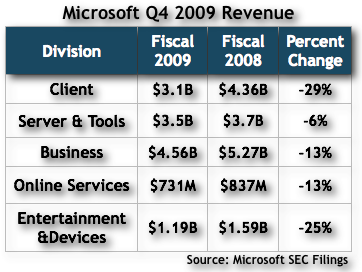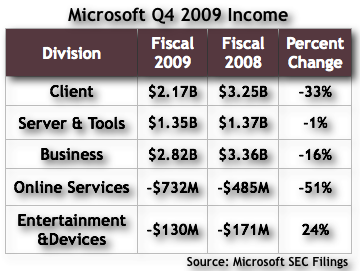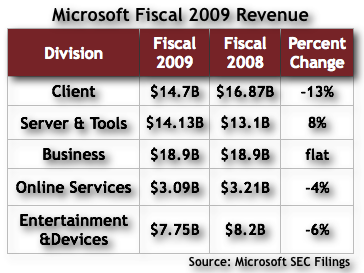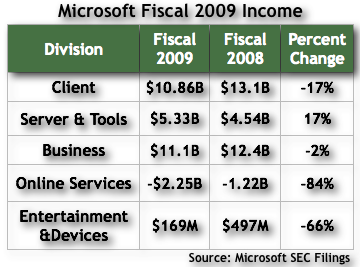By Scott M. Fulton, III, Betanews

It's a very big slice of a shrinking pie. As the netbook form factor serves as a much-needed lifeboat for most PC manufacturers, driving average selling prices (ASPs) lower across-the-board, premium PC maker Apple is left with almost complete command of the higher end of the market. Those are the findings of research firm NPD earlier this week, as first reported by Betanews blogger Joe Wilcox. He computed the numbers NPD delivered, and concluded that in terms of revenue (not unit sales), more than nine of every ten dollars spent by Americans on computers whose prices are $1,000 or greater, are collected by Apple.
For the Apple faithful, being able to quote any Microsoft-like market share number in their favor is like Christmas come early. It means there's a genuine market segment where Apple is in complete control. But as those who know Apple very well are saying -- folks like NPD Vice President of Industry Analysis Stephen Baker, who is responsible for the numbers Wilcox cited and who spoke with Betanews this morning -- Apple has a little secret: It doesn't really care about market share.
"I just don't think that the state of the economy in the long run matters a lot to Apple, or impacts them one way or the other," said Baker. "They have a pretty stable market, [and] they're able to continue to sell into that market...Let's not forget that Apple is really, on the hardware side, two different companies. The MacBook computer company is a premium company that has no interests in being #1 in market share, has really no interest in volume. It has an interest in building great products and managing the business to the right profit margins at the right prices."
While Apple is by no means immune to the ill effects of the bad global economy, it is clearly not suffering. Late last month, the company posted quarterly results showing net sales rising 11.7% over the year-ago quarter, and margins rising just over a point to 36%. But even though those are overall margins -- which also takes into account iPhones, whose cost of production continues to decline -- they're still not ideal, especially for a company that essentially owns the premium computer market. And even though Apple is selling 4% more Macs now than it did at about this time last year, it's reaping 8% less net profit from those sales.
"Their notebook sales have struggled so far in 2009, their overall sales in the first six months were negative versus 2008. So they've struggled, they recognize that in a more recessionary economy, they need to be a bit more price competitive," Baker told us. "[With] the last MacBook Pro upgrade, they definitely reduced their prices; and certainly at the entry level price points, their products are pretty competitively priced when you do all the math."
So is Apple's firm stake to the premium market actually a tenuous position to be in, given the state of this economy? Illuminata Senior Analyst Gordon Haff told Betanews this morning that he believes there's a danger in folks overstating Apple's case, even on the company's behalf.
"There's something to be very careful of with respect to those numbers. They are specifically Apple's share of >$1000 PCs in US retail," said Haff. "That's not at all the same thing as overall share when you consider that Apple has a fairly substantial network of their own retail stores; and many of the premium PC models, such as the Dell Adamo and HP Blackbird, aren't commonly available at retail outlets such as Best Buy, if they're available at all. That's not to contradict the basic point that Apple has a much bigger slice of the high-end market than they do overall, but those numbers do somewhat overstate the case." But does that mean Apple's 91% isn't really much of an island to stand on after all? Stephen Baker says no:
“This is where Apple, like every other vendor that has traditionally sold conventional form factors like laptops and desktops, needs to be very careful about cannibalizing its existing line.” Carmi Levy, independent analyst and Betanews contributor |
To remain competitive, all the other players that lack Apple's unique ability to stake claim to premium PCs, have had to rush to the "value" side of the market in order to eke out a profit. The netbook form factor has saved the rest of the PC economy. Meanwhile, Apple plays this game as though it doesn't need a netbook and doesn't want one. As I argued to NPD's Baker, maybe market share really doesn't matter to Apple -- maybe it's just fine where it is.
"You know what? I think you're not incorrect, but I do think that even in these economic times, Apple needs to find some ways to be more accessible to a bigger range of consumers. In the PC side of their business, they likely need to do some kind of permanent SKU, permanent product at about a $799 price point, to make sure that their customer base stays focused on that. Because they are a little separated from the rest of the PC market, they really do need to offer a little bit better in terms of value. They don't need a $399 netbook in their MacBook line, clearly; nor do they need something [MacBook] at $599, none of those things are a benefit to them.
"They need to do something around the $399 - $599 price point that is netbook-like, but that re-invents the concept of what the netbook has been thought of," Baker continued. "I think there's a huge opportunity for them there in what Intel and others have called a Mobile Internet Device."
Next: Analysts debate the merits of the "iPhone-Plus-Plus"
Here is Stephen Baker's proposition: Apple has positioned itself perfectly to create and produce a high-level device with a larger screen than an iPhone, that appeals to some of the same consumers who would be considering netbooks, but which isn't (like some other netbooks) a cheap computer. And it can afford to take that gamble, and maybe break even at the outset, because of its firm stronghold in the premium side of the PC market. MacBook, in other words, is the fountain from which new upper-level iPhones may flow.
This new product that Apple would produce, as Baker describes it to Betanews, "would be more of...a step up off the iPod Touch, that would offer a bigger screen, offer a little different experience, than what you get from an iPhone or from an iPod Touch, but still not be associated with what is going on in their PC business. Those margins, and the way they manage that business, really needs to be carefully nurtured, and they have to be careful about how aggressive they can be in price without really destroying the margin structure there. But there are opportunities in a category like the iPod segment where clearly the market is saturated -- they need a new paradigm in there to kind of revisit and reinvigorate that segment."
Are we talking about what ARM and Qualcomm have advanced as something called a "smartbook?" No, says Baker: "If it's got a clamshell and a keyboard, then that's a computer in my mind.
“I don't think there's any question that Apple knows what they're doing...Not everybody has to sell a zillion units to be profitable or be successful.” Stephen Baker, Vice President of Industry Analysis, NPD |
In other words, Baker's "Super-Duper-iPod/iPhone-Plus-Plus," as he referred to it (probably a temporary name) doesn't really have to be the greatest Internet computer on the planet, because it's not a computer. More importantly, it's the $799 device that Apple needs in its arsenal, without being the netbook that it doesn't want to be associated with.
This afternoon, I ran that proposition past another of Baker's friends and colleagues, our own Betanews contributor and independent analyst Carmi Levy. Carmi sees the appeal in Apple's being able to address a certain mobile professional with an iPhone that's a little something more. Such a device, he says, would address that buyer's need for "instant-on" functionality, followed by the ability to catch up with, and produce small batches of, work.
"It makes a lot of sense for Apple to extend the form factor of a device that already offers a fairly well-evolved mobile user experience, which is the iPhone or the iPod Touch," Carmi told me this afternoon. "These things are far more effective as mobile workflow than a netbook running Windows XP, that needs to boot every time you simply want to check your mail or update your blog or check the weather while you're out."
It's difficult to define just what this device would be. Illuminata's Gordon Haff this morning tried to pin it down on the low end of the MacBook scale: "[Apple] can't be oblivious to pricing realities. It may well make sense for them at some point to introduce a low-priced notebook if they can do something interesting and distinctive with the design. But a flat-out, cost-focused system like most netbooks? No, it doesn't really make sense for them." So certainly not a netbook; but Carmi Levy adds to that, it can't really be another notebook either:
"Apple's go-forward strategy needs to be not mimicking what's already gone before. And Apple's never done that anyway; it's not like they're about to start. They've made it very clear they're not going to ape the existing netbook form factor, and that's the smartest thing they could possibly do. They've also indicated that they can't create a computer for $399. Doesn't mean they can't create another device for $399; the iPod Touch sells for a lot less than that. So you have to reach into the language: Apple will introduce devices both above and below that $399 price point, but they certainly won't look like a netbook."
Here's the problem: Baker's new "super-iPhone" would have to work unlike a netbook. It would have to work like something more than an iPhone. And yet it cannot, and perhaps should not, work like a MacBook -- especially not if Apple wants to maintain that 91% stronghold for very long.
"We are at the very early stages of figuring out what it is that we like to do while we're on the go. The concept of mobile workflow means something different to everybody depending on how they define it," remarked Betanews' Carmi Levy. "So because this is a relatively new market, and it's quite likely the only bright spot in an otherwise devastating consumer electronics market these days, vendors are rushing into it, in some cases without giving a whole lot of thought to what those end user needs will ultimately be. They're simply hoping that what they throw at the wall sticks.
"This is where Apple, like every other vendor that has traditionally sold conventional form factors like laptops and desktops, needs to be very careful about cannibalizing its existing line. It's a challenge that's been faced by every tier-1 vendor; certainly HP has faced it. There is an acceptance and understanding that a certain percentage of their netbook buyers are in fact buying netbooks instead of laptops."
NPD's Baker believes Apple's solution to this problem is simple: Clearly distinguish, with branding and appearance and capability, that this new device is in the iPhone line and not the MacBook line.
“At the end of the day, Apple is a relatively high-end brand and they've done pretty well with that strategy to date. They can't be oblivious to pricing realities.” Gordon Haff, Senior Analyst, Illuminata |
But how would such a distinction be maintained? Apple's tool of choice to date in distinguishing the iPhone and iPod Touch from what should essentially be a small Macintosh, has been control: specifically, control over the level of functionality that these small devices are allowed to attain. Carmi Levy perceives that it would not be beneath Apple to use this same tool to control its $799 device.
And there may be the rub, where the entire plan could potentially backfire: "What [Apple] can't afford to do is deliberately hobble the device such that it does not provide the workflow that a mobile professional requires," Carmi said. "Apple may be afraid of cannibalizing the sale of a $1,300 MacBook Pro; but at the same time, if the market expects that that capability should be available at $799 and Apple fails to deliver it, Apple runs the very real risk of having that mobile professional look at another vendor. Apple may not want to cannibalize its own lines, but it may not have a choice to at least do that to a certain extent, if it wants to keep those potential buyers in the family."
One alternative that Apple may consider, Carmi suggests, is to build up the MacBook rather than tamp down this "super-iPhone." "Then what it does is, it opens up an opportunity to continue to add value to their top-line product," he said. "What Apple needs to do -- if in fact they're going to blow up the iPhone platform into a closer-to-full-sized form factor, at the $799 price point -- is ask themselves, if someone paying that much for that kind of device will be willing to jump through hoops to pay for his or her applications, and get at his or her data.
"And we all know the answer will be, no. The iPhone, as wonderful as it is, is not a workflow device. The challenge, obviously, is marrying the seamless workflow capability and cost-effectiveness of a full-on platform, with the instant-on mobility and seamless, on-the-go use of something based on an iPod Touch or an iPhone. Unfortunately, it's the convergence of capabilities that is not very easy to pull off, because if it was easy, then we would have seen it already...If it [can't], then essentially, it will be nothing more than an expensive iPhone that will languish as a niche, luxury product."
If anyone can pull this off, however, it's probably Apple. As Gordon Haff told us, "Apple just has more cachet as a company, and that's hard for someone who just makes the PC hardware to compete with."
As Stephen Baker believes, Apple's entire business model is geared toward doing just this very thing: "I think their whole business model surrounds the fact that they throw off an awful lot of money out of the MacBook business, and set that money to strategically invest in products and technologies that drive their brand, and drive the awareness of them, to higher levels. Otherwise they wouldn't have 300 stores, they wouldn't be spending all that money on the iPhone, and they wouldn't have bought a semiconductor company. They have a lot of freedom because of the kind of cash flow and profit margins that the MacBook throws off."
Carmi Levy advises anyone who disagrees with Baker's reasoning to check out not only Apple's track record, but Baker's. "If you look back at Apple's history, Mr. Baker's perspective bears out, because they essentially use their position as owners of an island, so to speak, in Macs, in the late '90s, to fund the development of the iPod. The fact that the iPod exists is largely due to the fact that Apple has sufficient cash flow from its supposedly niche operations in desktop and laptop computers. So essentially, Apple is simply reinventing history with that strategy in 2009. It's worked for the company before, and it's going to work for it again."
Copyright Betanews, Inc. 2009


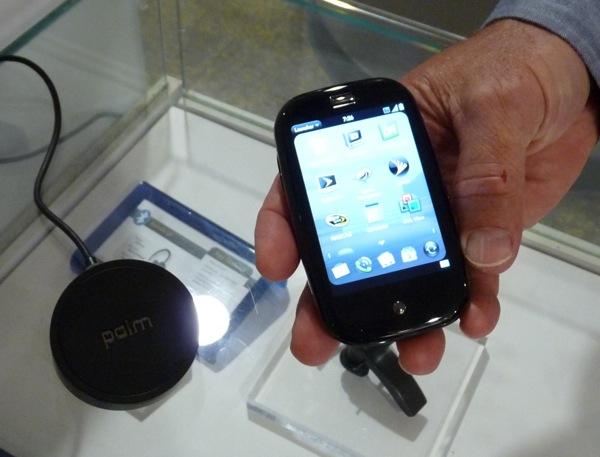
 I was strictly a Prosper lender (technically a loan buyer; the actual loans are three-year fixed items offered by regular lending institutions), treating the loan process as both a fun educational tool and a way to invest without touching the stock market, which I regarded then and now as dangerous id-driven hoodoo. (And that's why I write all those earnings reports for Betanews, kids.)
I was strictly a Prosper lender (technically a loan buyer; the actual loans are three-year fixed items offered by regular lending institutions), treating the loan process as both a fun educational tool and a way to invest without touching the stock market, which I regarded then and now as dangerous id-driven hoodoo. (And that's why I write all those earnings reports for Betanews, kids.) 